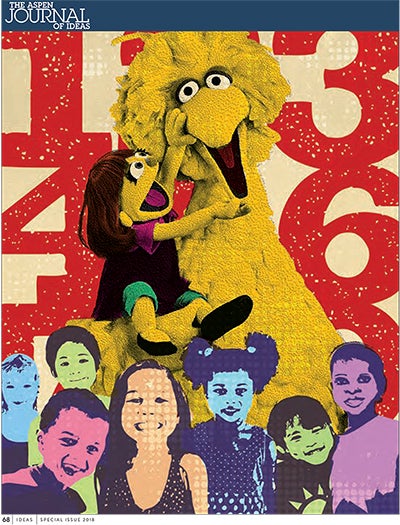 At Sesame Workshop, nothing means more than to hear we’ve touched a child’s life. One of my favorite letters was from a mother who used the Sesame Street autism storybook, We’re Amazing 1, 2, 3!, to explain to her daughter that she had autism like the character Julia in the book. The little girl responded, “So, I’m amazing, too, right?” The book—and Julia—are part of Sesame Workshop’s autism initiative, See Amazing in All Children, which is just one example of our impact around the world. For almost 50 years, Sesame Workshop has responded to children’s evolving needs, tackling tough issues from a child’s perspective. The best thing about working with talented teams of researchers, producers, and performers, as well as invaluable advisers and partners, is the ability to make a difference in children’s lives. When I participate in a forum like Spotlight Health, I get to do the second-best thing: share our work.
At Sesame Workshop, nothing means more than to hear we’ve touched a child’s life. One of my favorite letters was from a mother who used the Sesame Street autism storybook, We’re Amazing 1, 2, 3!, to explain to her daughter that she had autism like the character Julia in the book. The little girl responded, “So, I’m amazing, too, right?” The book—and Julia—are part of Sesame Workshop’s autism initiative, See Amazing in All Children, which is just one example of our impact around the world. For almost 50 years, Sesame Workshop has responded to children’s evolving needs, tackling tough issues from a child’s perspective. The best thing about working with talented teams of researchers, producers, and performers, as well as invaluable advisers and partners, is the ability to make a difference in children’s lives. When I participate in a forum like Spotlight Health, I get to do the second-best thing: share our work.
In the United States, Sesame Workshop has helped children cope with divorce, parental incarceration, and loss of a loved one. Internationally, we’ve focused on girls’ education, critical health issues, the needs of refugees, and more. We’ve been able to change how children—and adults—perceive themselves and the world. And we do it all through the power of media and Muppets.
Most people are familiar with icons like Cookie Monster or Elmo, but they are perhaps unaware of the lesser-known but no less beloved characters who help Sesame Workshop reach more than 190 million children globally. Children learn by seeing themselves represented on screen—so, when we create local Sesame Street productions in India or Afghanistan, we develop characters children can relate to, with story lines that reflect their realities.
The face of the autism initiative is Julia—a bright, adorable 4-year-old Muppet with autism. With such a high incidence of autism (one in 59 American children), Sesame Workshop created See Amazing in All Children to destigmatize autism, change perceptions, and foster empathy. The response has been incredible. Research shows that, after using See Amazing materials, parents of autistic children feel more comfortable involving them in the community, and parents who don’t have an autistic child greatly increase their knowledge and acceptance of autism. What’s most meaningful is hearing from parents who say that, because of Julia, their autistic child has more playdates, or from teachers who say that, because of Julia, students are more inclusive at playtime.
Julia comes from a long line of powerful characters. Take Kami, from the South African production, Takalani Sesame. In 1999, when seven million South Africans were living with HIV/AIDS and more than two million children were AIDS orphans, Sesame Workshop introduced Kami, the first HIV-positive Muppet. Beyond the physical and emotional effects of the epidemic, an unwillingness to discuss the disease led to ignorance, fear, and misconceptions. Kami was created to give children and adults a lexicon to talk about the disease, helping to break down the culture of silence.
One segment featured Kami and her friends playing the “train game,” where everyone chugs along together. To play, Kami’s friends had to touch her—showing that HIV isn’t transmitted through touch. Children who watched Kami showed substantial gains in knowledge about how HIV is and isn’t spread and had much more positive attitudes toward interacting with those affected. Parents and caregivers who watched Takalani Sesame were twice as likely to talk to children about the illness than those who didn’t, and educators were four times as likely to tackle the subject in class.
At that time, I witnessed dozens of pregnant HIV-positive women refuse free medical treatment that would virtually guarantee their unborn baby would be protected from the virus during childbirth. The stigma was that great. The fear of being shunned by their husbands or villages was enough for these women to risk their unborn children’s health. That’s when I knew introducing Kami could save lives. I am convinced that, by helping reduce the stigma surrounding HIV/AIDS, Kami has done just that.
Whether it’s AIDS in South Africa or autism at home, Sesame Workshop focuses on the most vital issues affecting children around the world. Today, half of the unprecedented number of global refugees are children; that’s why we are partnering with the International Rescue Committee to reach young Syrian refugees with early education. The need for this work has never been greater, but Sesame Workshop is dependent on philanthropic support to make these programs possible. We were so grateful to be awarded the MacArthur Foundation’s first “100&Change” grant for $100 million to fund this initiative. Together, we’ll create the largest early childhood intervention in the history of humanitarian responses.
I imagine there will soon be a new Muppet with a storyline young Syrian refugees can relate to, one modeling resilience, acceptance, and inclusion for those children as well as their new neighbors in Jordan, Lebanon, Iraq, and beyond—carrying on the powerful tradition of using media and Muppets to create a better world.